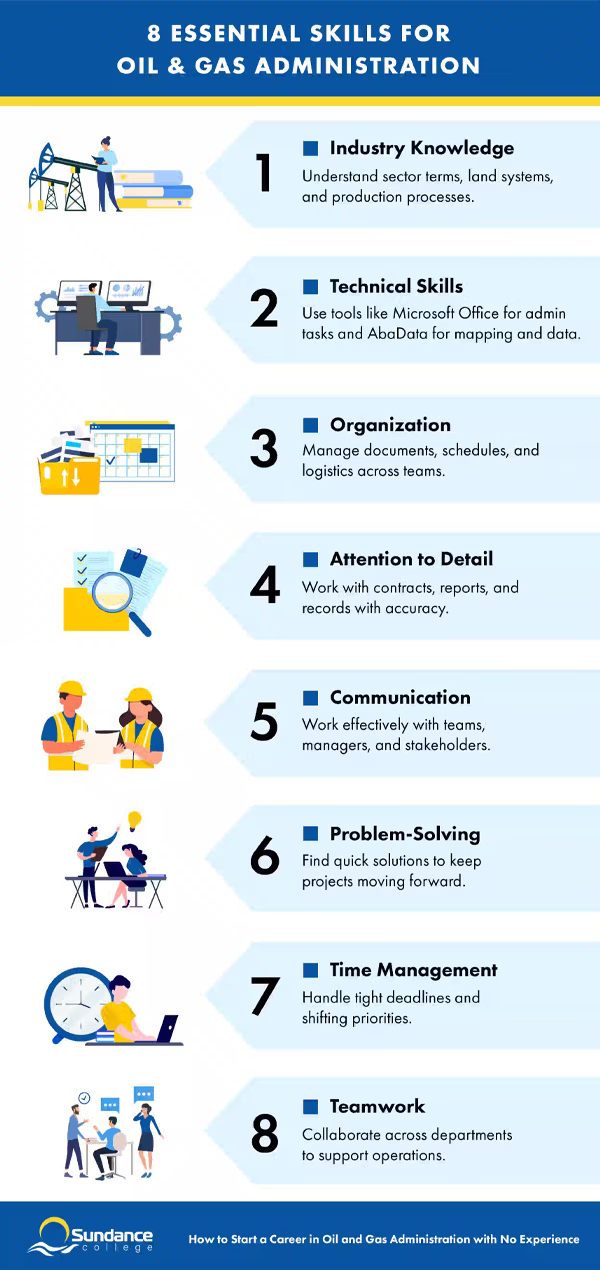Blog / How to Start a Career in Oil and Gas Administration with No Experience
How to Start a Career in Oil and Gas Administration with No Experience

Oil and Gas Administration Diploma
- Oil & Gas Administrative Assistant
- Land Systems Assistant
- Mapping Assistant
- Project Assistant
Table of Contents
In 2025, the Canadian energy sector is going through major growth, resulting in increased demand for skilled professionals in both traditional oil and gas jobs, as well as in renewables.
Drilling activity recently reached its highest point in a decade, and capital investment continues to increase as major projects like LNG Canada and the Trans Mountain pipeline start to come on line.
These trends, combined with innovations in sustainability and industry technology, make now the perfect time to start working in the field as an oil and gas administrator. Here’s how you can start this in-demand career with no prior experience:
Listen to: How to Start a Career in Oil and Gas Administration with No Experience
What Do Oil & Gas Administrators Do?
With an oil and gas administrator job, the work you do puts you right at the centre of energy operations.
While field crews handle drilling and production, your responsibilities will focus on keeping projects organized, data accurate, and communication flowing between departments.
Here’s what you’ll typically handle:
- Production Accounting Support: Tracking production volumes, royalties, and revenue distribution using specialized financial and accounting methods.
- Land Systems and Mapping: Maintaining accurate lease records, mapping data, and keeping up-to-date with ownership information to support drilling and exploration decisions.
- Exploration and Field Operations: Assisting with project logistics, vendor coordination, and documentation for exploration and field activity.
- Industry Documentation: Organizing and managing documents like lease agreements, contracts, regulatory filings, and operational reports.
- Communication and Coordination: Acting as a central point of contact between field teams, office staff, management, and external stakeholders.
You’ll work across departments like engineering, legal, finance, and project management, adapting to fast-moving workflows and shifting priorities. Work environments include corporate head offices, regional energy hubs, and administrative support centers tied to upstream, midstream, and downstream operations.
No matter the setting, the right training will prepare you to succeed in any of them.
Why Choose a Career in Oil and Gas Administration?
It’s a great time to consider an oil and gas career. Right now, the Canadian energy sector is seeing growth fuelled by market access, rising drilling activity, and major investments. But it’s not just expansion that’s responsible for more opportunities in oil and gas: it’s innovation.
New technology is pushing the oil and gas industry’s growth as well. Companies are using advanced drilling methods and digital assessments to tap into reserves that were once out of reach. At the same time, provinces like Saskatchewan are making steady progress in areas like geothermal energy, with new operations planned for 2026.
These developments reflect a broader trend: energy companies are now looking for professionals who understand both traditional systems and the future of the industry.
Sundance College’s Oil and Gas Administration diploma program makes sure you graduate ready to enter roles in production accounting, land management, regulatory support, and more:
“We don’t just teach the basics of oil and gas. Our students also learn about alternative energy sources and the latest industry technology, so they’re prepared to support both current operations and future projects,” says Pola A., Sundance’s Oil and Gas Administration instructor, explains.
“We prepare students for their future.”
This comprehensive curriculum means you won’t just get hired; you’ll have room to grow. With experienced professionals retiring and new projects underway, employers are actively looking to fill essential administrative positions that keep operations running.
How to Become an Oil & Gas Administrator
With no experience, the best way to break into the field is by enrolling in an Oil and Gas Administration diploma program to get knowledge, skills, and sought-after experience in an oil and gas administration setting.
A well-rounded diploma program will equip you with essential knowledge like industry terminology and insights into alternative energy and skills in production accounting and digital tools such as AbaData.
Through hands-on learning and a practicum included in your oil and gas training, you’ll be able to build the workplace experience and soft skills needed to succeed in this growing field.
Essential Skills and Qualifications Needed

To succeed in oil and gas administration, you’ll need a strong mix of administrative, technical, and industry-specific skills. Employers are looking for professionals who can keep pace with complex operations while adapting to modern systems and sustainability goals.
Here are the essential oil and gas skills you’ll develop through training and hands-on experience:
- Industry knowledge of terminology, production workflows, and land systems will help you handle sector-specific tasks.
- Technical proficiency with industry-relevant software like AbaData for land mapping.
- Organizational skills to help manage schedules, documents, and logistics while balancing multiple tasks across departments.
- Attention to detail for working with important documents like lease agreements and production reports.
- Communication skills for when you’re working closely with field teams, managers, and stakeholders.
- Problem-solving for when issues come up and need solutions quickly to keep projects moving forward.
- Time management for when you’re handling shifting priorities and tight deadlines in a fast-moving environment, especially when supporting active projects.
- Teamwork during times when you need to collaborate with multiple departments to keep operations aligned and efficient.
When you develop these skills and earn the right qualifications, you’ll build a foundation that employers are actively seeking.
Entry-Level Job Opportunities in Oil and Gas Administration

Pursue these entry-level oil and gas jobs with your Oil and Gas Administration diploma:
- Land Systems Assistant
- Mapping Assistant
- Project Assistant
- Production Accounting Assistant
- Office Assistant/Coordinator
These roles are often the starting point of your career in oil and gas, offering exposure to operations and important company systems.
Why Choose Sundance College?
Sundance College’s Oil & Gas Administration Diploma program is designed to meet you where you are, whether you’re starting your first job in the energy sector or looking to build on experience. In 43 weeks, receive practical oil and gas training that reflects what employers expect from today’s administrative professionals.
Here’s what you can expect:
- Industry-aligned curriculum covering the full scope of current and future oil and gas workplace expectations.
- A five-week practicum that gives you hands-on experience in an oil and gas work environment.
- Instructors with years of real-world experience who bring relevant insights into the classroom.
- Flexible scheduling options so you can balance your studies with other responsibilities.
By the time you complete your oil and gas training, you’ll have the practical knowledge, industry insight, and practicum experience needed to start working in professional administrative roles across the Canadian energy sector.
When you choose oil and gas administration, you’re choosing a future-proof career filled with opportunities. With industry-aligned training, one-on-one student support, and hands-on practicum experience, you’ll develop skills that matter, making you stand out to employers throughout the energy sector.
A future oil and gas career could be in the pipeline for you.
Get the training, practicum experience, and support you need to fuel it. Connect with an advisor today!
FAQ
-
What is the average starting salary for oil and gas administrators in Canada?
You can start earning up to $55,993 or more depending on your location, employer, and level of responsibility.
-
How can I advance my career in oil and gas administration?
Earning a diploma is the fastest way to advance your current oil and gas administration career!
-
Can I specialize in a specific area of oil and gas administration?
Absolutely. You’ll have options to focus on areas such as land management, production accounting, project coordination, or regulatory compliance, depending on what speaks to your interests and strengths.
-
What are typical working hours and is remote work possible?
Most positions offer regular full-time hours, though some overtime may be needed during major projects.
-
How does this program support students with no prior experience?
You’ll receive practical, industry-aligned training, and a practicum that lets you build experience. Supportive instructors and career advisors will help you bridge any knowledge gaps and provide hands-on learning that helps you get the skills you need to succeed.
-
What support services are available for graduates seeking employment?
You’ll benefit from job search workshops, resume and interview coaching, and a dedicated Career Services team that can help you make industry connections.
Related Blogs
Subscribe for more career advice
Blog Categories
Share on:
